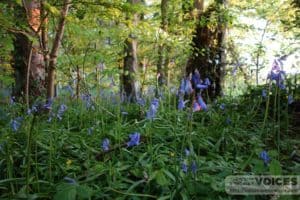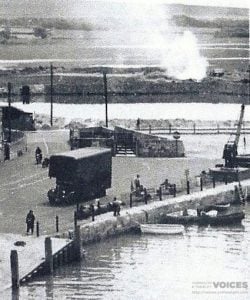The trouble with going to Southampton was, if I remember rightly, the boats packed up early and you couldn’t get out of the ground and catch the train in time to get down for the last boat.
It was quite easy to go to Portsmouth because you could get on the train down here, right through to Ryde, over to Portsmouth and walk up to Fratton Park. We used to do that nearly always on the Bank Holiday.
One the Bank Holiday it was Grimsby Town and they had Tweedy, I can remember him playing in goal, and Glover, the centre forward. Of course Pompey in those days had the outside right Harris, the nippy little outside right. Phil Kelsey b 1920
Category Archives: Uncategorized
Jean Maitland: Trips and Treats at Sandhard
When we were kids, we would be met at church by our parents and then go to Sandhard for our Sunday Lunch, us and all of the Gatrells. Of course there was a toll on the bridge in them days so our dad and the Gatrells used to borrow a boat and row us over. We used to stay over there until about half past six. Jean Maitland nee Levey b 1928
Joan Cokes: Trips and Treats to Sandhard
Eileen Smith: Trips and Treats in the lifeboat
During Cowes Week the families of the lifeboat crew used to have a wonderful treat.
On Wednesday, Thursday and Friday during Cowes Week the Yarmouth lifeboat went to Cowes to take people out to see all the liners and naval boats visiting Cowes, anchored offshore, and all the grand yachts like the ‘Victoria and Albert’. The Bembridge boat did the other days. It raised money for the RNLI.
The families of the crew were allowed to travel in the lifeboat to Cowes, leaving Yarmouth at 9.30 and returning at 3.30. We used to have the first trip out to see all the grand boats. Then we children would paddle a bit and eat our sandwiches whilst sitting on the Green watching all the boats. Sometimes the sea was a bit choppy, but we didn’t mind. We loved our special week. Eileen Smith nee Lansdowne b 1921
Alec Cokes: Free Time 1950s 1960s
One time there was a big classic football match going on up the Rec. Jim Ryall then was the Fire Chief – and he was up there watching the football .
All of a sudden two figures came up across the back of the Rec, right across the middle of the playing field and disappeared. It was Dicky Hatch and Dook Henderson. They’d only managed to set fire to the rushes down the marsh. There was a big cloud of smoke.
Somebody said, Jim, Jim, the marsh is burning. He said, let it burn. No point in getting down there with the fire engine, what was the point of that, it wouldn’t do any harm.
I can remember Rodney with his touchwood tin – he used to have a Golden Syrup tin, punched some holes in it with a bit of wire for a handle, get the old rotten wood out the middle of the trees and put something in to start it burning and of course you had a flame and if you wanted to light the marshes or something you just let go! Nothing ever blew up.
Mick, he was a bugger, he’s a bit older than us – and he was very good with these bows and arrow he used to make. We used to get in the middle of the Rec. a whole gang of us, about twenty of us, and he would fire this thing up in the air. He’d have reeds for arrows with a bit of elder for the tip and a feather and a nail stuck in it, and he’d fire it straight up in the air – a game of chicken, watching this thing to see which way it was going to go. Alec Cokes b 1945
Alec Cokes: Free Time 1950s
‘ Brimmo’ – he was one of the gang leaders and his sort of base was in this builder’s yard just down the bottom of the garden. We had our Dinky toys and all the rest of it in the yard. There were several of those little cannons about – they were yacht race cannons really for starting races. They used to take them on their boats and fire them off. They weren’t very big, only about nine inches or a foot long. There was no gun carriage, it didn’t look like a little gun, it was just a brass pipe basically. It wasn’t a miniature cannon but it made a bang when you fired it. In those days everybody used to load their own shot gun cartridges, so everybody had shot and wadding, it was in every back garden shed.
This toad hopped out of the water butt – somebody fired at it with a catapult and missed it. The suggestion came up that we get this cannon and trig it up, and we’ll get this toad. We went indoors, got the cannon set up on a couple of bricks with a couple of bricks holding it down, rammed it and all the rest of it, lit the touch hole and all retired round the next pile of bricks. We were all cowering behind the bricks and – nothing.
Everybody said, ‘ Well, what are we going to do then?’
Dicky in the end went out round and kicked it, and it went off. Of course, it fell off the bricks and he got one of the pellets lodged in his eye. He went home because he only lived in Ommanney Road, and didn’t tell his mum. The next day at breakfast, she said, ‘What’s wrong with your eye, Nipper?’ And he said, ‘I’ve got something in it.’
I think it was the lead poisoning that caused him to lose his eye rather than the impact. Alec Cokes b 1945
Mary Lord: Free Time 1950s
If we went anywhere, we went by bus – train was too expensive – but we didn’t go far. Yarmouth was our world. I loved Mill Copse and spent hours there. The bluebells, primroses … I hated it when it was all planted up with conifers. I was a great presser of flowers, had a collection of pressed wild flowers. One year in Mill Copse I found butterfly orchids to press for my collection. In later years I went back to look but never found them again! Mary Lord nee Hayles b 1936
Alec Cokes: Free Time at the Dump 1950s
The Dump was quite a big thing in our little lives and the dump was always alight.
Do you remember those Kiora bottles with the big clamp? We used to get those and half fill them with water then put them in the fire and stand around watching – eventually they would just blow to bits because the top wouldn’t come off, and that was another chicken game. If you were close enough to see it properly you could see it boil and you’d have steam and water but immediately the water disappeared and it became steam, you were out of there, and this glass used to go everywhere!
Alec Cokes b 1945
Phil Kelsey: Free Time at Sandhard 1920s
One of our trips was to go to Sandhard with my mother and the rest of the family. We used to get in the boat down by the Mill.
Sometimes mother got in if it was reasonable but she didn’t often. George and perhaps the rest of the kids rowed over to Sandhard, dumped them off, then rowed back to the bridge. There used to be a landing stage right in the corner there and we used to get Mother in there and take her across. We used to drop her off there because, probably by the time we were coming back, the tide would be gone out. It was awkward to get out down the Mill so we used to drop her off there, and one or two of us used to come and scrabble up over the wall down the bottom. Phil Kelsey b 1920
Eileen Smith: Free Time at Love Shore 1950s
The only problem you had on the beach was the guns going off above you from the sailing. The West Wight Scows were anchored off Love Shore and Dr Drummond’s, his was white with a red band round it, and was called Pillbox. They used to race every Wednesday and Saturday afternoon and they had their gun in their little shed at the bottom of the Deacons’ garden. Sometimes they’d never fire the gun, they’d say: Bang!
They didn’t like us down there because we were shouting and laughing and goodness knows what. They couldn’t stop us because the lane going down to the shore was a public right of way. We used to walk right through to the next lane, along the stones from Fryer’s Lane right up to the Common. Eileen Smith nee Lansdowne b 1921






